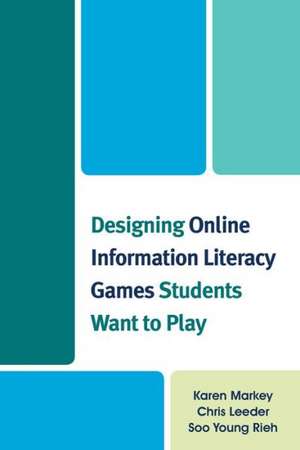Designing Online Information Literacy Games Students Want to Play
Autor Karen Markey, Chris Leeder, Soo Young Riehen Limba Engleză Paperback – 12 mar 2014
Preț: 638.32 lei
Preț vechi: 828.98 lei
-23% Nou
Puncte Express: 957
Preț estimativ în valută:
122.15€ • 126.81$ • 101.86£
122.15€ • 126.81$ • 101.86£
Carte tipărită la comandă
Livrare economică 22 martie-05 aprilie
Preluare comenzi: 021 569.72.76
Specificații
ISBN-13: 9780810891425
ISBN-10: 0810891425
Pagini: 279
Ilustrații: black & white tables, figures
Dimensiuni: 155 x 227 x 21 mm
Greutate: 0.46 kg
Editura: Rowman & Littlefield
ISBN-10: 0810891425
Pagini: 279
Ilustrații: black & white tables, figures
Dimensiuni: 155 x 227 x 21 mm
Greutate: 0.46 kg
Editura: Rowman & Littlefield
Notă biografică
Cuprins
List of Figures
List of Tables
Preface
Acknowledgments
Chapter 1. The Promise of Games for Information Literacy Instruction
Introduction
Definitions of Information Literacy
The Evolving Concept of Information Literacy Instruction
Multiple Approaches to the Information Literacy Concept
Methods of Information Literacy Instruction
Research on the Benefits of Information Literacy Instruction
Barriers to Information Literacy Instruction
Games and Learning
The Rise of Games in Libraries
Games for Information Literacy Instruction
Online Information Literacy Games
Evaluating Educational Games
Summary
Chapter 2. The Needs Assessment
Introduction
Formulating the Game¿s Overarching Learning Objective
Asking Eight Questions for the Needs Assessment
Understanding Why Students Prefer the Open Web Over the Library
Research on How Students Judge the Credibility of Online Information
Determining the Right Audience for a Library Research Game
Summary
Chapter 3. The Design of an Information Literacy Game
Introduction
Premises for the Design of Information Literacy Games
Planning the BiblioBouts Information Literacy Game
Involving Instructors in Game Play
Discussion
Summary
Chapter 4. The BiblioBouts Administrator Interface
Introduction
Super Administrator Functionality
Game Administrator Functionality
Discussion
Summary
Chapter 5. The BiblioBouts Game
Introduction
The Structure of the BiblioBouts Game
Preparing for Game Play
Playing the Closer Bout
Playing the Tagging & Rating (T&R) Bout
Playing the Best Bibliography Bout
Consulting the Post-Game Library
User Support for the BiblioBouts Game
Enlisting Library Liaisons
Using Email
Making Videos Available
Giving Super Administrators an Account-Login Tool
Publishing FAQs
Scoring Issues
Summary
Chapter 6. The Methods Used to Evaluate BiblioBouts
Introduction
Research Questions
Game Diary Forms
Pre- and Post-Game Questionnaires for Students
Focus Group Interviews with Students
Follow-up Interviews with Students
Logs of Students¿ Game-Play Activity
Interviews with Instructors
Interviews with Library Liaisons
Summary
Chapter 7. Preparing Students to Play BiblioBouts
Introduction
Instructors¿ Expectations
Research Paper Assignments
In-Class Preparation
The Challenge of Technology Problems
Discussion
Summary
Chapter 8. How Students Played BiblioBouts
Introduction
Overview of BiblioBouts Games
Styles of Game Play
Daily Game Play Activity
Time Spent Playing the Donor Bout
Time Spent Playing the T&R Bout
Total Time Spent Playing BiblioBouts
Discussion
Summary
Chapter 9. How Students Evaluated BiblioBouts Sources
Introduction
Class Assignments
Do Students Submit Relevant Sources to BiblioBouts?
Do Students Submit Scholarly Sources to BiblioBouts?
Do Students Correctly Identify the Information Formats of BiblioBouts Sources?
What Criteria Do Students Use to Assess BiblioBouts Sources?
Students¿ Credibility and Relevance Assessments
Credibility Assessments
Relevance Assessments
Whether Players and Experts Agree on the Credibility of Online Sources
Discussion
Summary
Chapter 10. How BiblioBouts Influenced Students¿ Research Papers
Introduction
Research Questions and Methods
Does Source Quality Improve at Each Step of the Research Process?
Do Players Cite Better Quality Sources than Non-Players?
Do Players Cite More Sources Than Non-Players?
Do Players Cite BiblioBouts Sources in their Research Papers?
Discussion
Summary
Chapter 11. How Students Benefited from Playing BiblioBouts
Introduction
Improved Perceptions of their Information Literacy Skills
Greater Familiarity with Library Databases
Exposure to More and Varied Sources
Practice Evaluating Sources
Learning How to Use the Zotero Citation Management Tool
Conducting Library Research Collaboratively
Playing a Game While Conducting Library Research
Benefits from the Instructors¿ Viewpoint
Students Who Did Not Benefit from Game Play
Discussion
Summary
Chapter 12. Best Practices for Building Information Literacy Games
Introduction
Revisiting the Needs Assessment
Getting Started on Game Design
Developing the Scoring System and How to Win
Implementing the Game in Course Contexts
Managing the Design Team
Game Design Exercise
Summary
Chapter 13. Best Practices for Administrator, Instructional, and User-Support Services
Introduction
Designing the Super Administrator Interface
Designing the Game Administrator Interface
Establishing Instructional Support Services
Putting User Support Services in Place
Discussion
Summary
Chapter 14. The Future of Information Literacy Games
Introduction
The Future of Information Literacy Games
Lessons Learned from BiblioBouts
Ideas for Future Online Information Literacy Games
Conclusion
Appendix A. Game Diary Form for Students
Appendix B. Pre-game Questionnaire for Students
Appendix C. Post-game Questionnaire for Students
Appendix D. Focus Group Interview Questions for Students
Appendix E. Follow-up Interview Questions for Students
Appendix F. Game Logs
Appendix G. Personal Interview Questions for Instructors
Appendix H. Personal Interview Questions for Library Liaisons
Bibliography
Descriere
Designing Online Information Literacy Games Students Want to Play sets the record straight with regard to the promise of games for motivating and teaching students in educational environments. Drawing from their own first-hand experience, research, and networking, the authors ...
